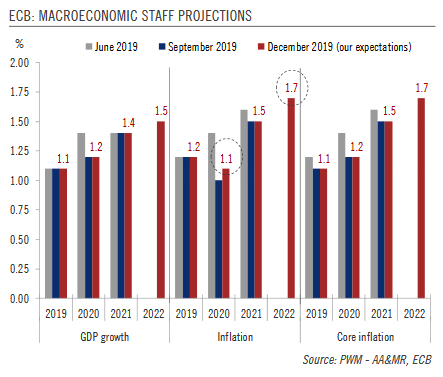US policymakers’ bold actions in response to the coronavirus bear some traces of the free-wheeling deficits, repressed interest rates and central bank activism (money creation) that form the cornerstones of the Modern Monetary Theory (MMT) playbook. MMT’s popularity is likely to persist, gaining converts among those who previously supported classic assumptions about budget constraints or the ‘crowding out’ of private investment by growing government indebtedness. MMT’s proponents see the bond market’s placid reaction to massive covid-19 fiscal packages as proof that the limits to government debt issuance are indeed much farther away than feared. In our central scenario, we see a ‘soft’ version of MMT being adopted by US policy makers in the years ahead. Howver,
Topics:
Thomas Costerg considers the following as important: 2.) Pictet Macro Analysis, 2) Swiss and European Macro, Featured, newsletter, Pictet
This could be interesting, too:
investrends.ch writes Pictet steigt in den Schweizer Treuhandmarkt ein – Partnerschaft mit Tretor
investrends.ch writes Die Schweiz an der Schwelle zur digitalen Transformation der Fondsindustrie
investrends.ch writes Pictet setzt bei neuem Hedgefonds auf KI
Nachrichten Ticker - www.finanzen.ch writes Die Performance der Kryptowährungen in KW 9: Das hat sich bei Bitcoin, Ether & Co. getan

US policymakers’ bold actions in response to the coronavirus bear some traces of the free-wheeling deficits, repressed interest rates and central bank activism (money creation) that form the cornerstones of the Modern Monetary Theory (MMT) playbook.
MMT’s popularity is likely to persist, gaining converts among those who previously supported classic assumptions about budget constraints or the ‘crowding out’ of private investment by growing government indebtedness. MMT’s proponents see the bond market’s placid reaction to massive covid-19 fiscal packages as proof that the limits to government debt issuance are indeed much farther away than feared.
In our central scenario, we see a ‘soft’ version of MMT being adopted by US policy makers in the years ahead. Howver, we do not think the Federal Reserve will be brought directly under White House control, as MMT in its purest form might suggest. Nonetheless, with the Federal Reserve and the American political class remaining under considerable pressure to stimulate the economy in the years ahead, the risk persists of sliding into a ‘purer’ form of MMT, which we would see as negative for macro and financial stability.
MMT’s supporters say that the lack of inflation in recent years is a sign that there is not enough ‘money’ (i.e. budget deficits) in the system. In short, the tenants of MMT see persistently low inflation in recent years as the consequence of insufficient money circulating in the economy and believe that more public debt should be issued to rectify the situation. They think that governments have a lot of room to issue debt, and that they can (and should) better coordinate both fiscal and monetary policy levers to boost the economy.
Much more problematically, MMT proponents also believe that the separation between the Department of the Treasury and the Federal Reserve is artificial; the two should be merged and official interest rates brought down to zero. The main lever of economic policy should be the federal budget rather than interest rates. Elected officials’ main job, they say, should be to decide on the regulation of money supply via budgetary spending. Critics argue that money printing cannot be unlimited. MMT in its purest form, these critics say, could bring substantial financial and monetary instability.
A slide towards pure MMT would carry immense risks. A combination of very loose fiscal and monetary policy could increase the risk of financial instability, lead to waves of ‘bubbles and bust’ and end up fuelling public mistrust of policy making.
MMT could well revive the balanced portfolio approach to investing, but diversification should not solely focus on 10-year US Treasuries due to the limited upside they have left. In these circumstances, we believe that gold could be a good replacement or bonds in the balanced portfolios.
Tags: Featured,newsletter,Pictet








